
Finding Your Artificial Intelligence Ally
The age of artificial intelligence (AI) is upon us, and businesses of all sizes are scrambling to harness its potential.
From streamlining operations to enhancing customer experiences, AI offers a plethora of ways to gain a competitive edge. But with a burgeoning market flooded with diverse AI solutions, the question remains: how do you choose the right AI for your business?
Understanding Your Needs: The First Step to AI Success
Before diving into the tech pool, a critical introspection is required. What are your business goals? Do you aim to boost efficiency, personalize customer interactions, or gain deeper insights into your data? Clearly defining your objectives will guide your AI search, preventing costly misalignments.
For instance, a small e-commerce startup might prioritize AI-powered chatbots for 24/7 customer support, while a large manufacturing company might seek AI-driven predictive maintenance to minimize downtime. Aligning your needs with the right AI solution is crucial for maximizing its impact.
The AI Toolbox: A Glimpse into Powerful Possibilities
Let's explore the vibrant toolbox of AI solutions at your disposal:
-
Customer Relationship Management (CRM): AI-powered CRMs can analyze customer data, predict churn, and personalize marketing campaigns, fostering stronger relationships and driving loyalty.
-
Marketing and Sales: AI can craft targeted ads, personalize website content, and even generate sales leads
-
Human Resources: AI can screen resumes, conduct interviews, and even onboard new employees.
-
Operations and Logistics: AI can optimize supply chains, predict equipment failures, and improve production efficiency.
-
Data Analytics and Business Intelligence: AI can analyze vast amounts of data, uncover hidden patterns, and generate actionable insights.

Choosing the Right Ally: Key Considerations for a Successful Match
With so many AI options available, the selection process can be overwhelming. Here are some key factors to consider:
-
Scalability: Can the AI solution adapt to your growing business needs?
-
Integration: Does it seamlessly integrate with your existing software and systems?
-
Security and Privacy: Does the AI vendor prioritize data protection and comply with relevant regulations?
-
Cost and ROI: Does the solution offer a good value for money, with measurable returns on investment?
-
Ease of Use: Is the AI solution user-friendly, even for non-technical team members?
By carefully evaluating these factors, you can ensure that your chosen AI partner aligns with your business goals and delivers tangible results.
Expanding Your Horizons: Beyond the Hype, Embracing a Future of AI-Powered Growth
Remember, AI is not a magic bullet. Its success hinges on clear strategic alignment, ethical implementation, and a human-centric approach. View AI as a powerful tool to augment human capabilities, not replace them. Focus on tasks where AI can excel, freeing up your team to focus on creativity, innovation, and building meaningful customer relationships.
Embrace a culture of continuous learning and experimentation. As AI technology evolves, stay updated on new advancements and explore opportunities to expand your repertoire. Remember, the journey with AI is a marathon, not a sprint. Invest in building a solid foundation of data, processes, and talent, and prepare to witness the transformative power of AI propel your business towards new heights.
The future belongs to those who embrace AI. Choose your ally wisely, expand your horizons, and unlock a world of possibilities.
Trending
-
1 UK Tech Sector Secures a Third of European VC Funding in 2024
Azamat Abdoullaev -
2 France’s Main Problem is Socialism, Not Elections
Daniel Lacalle -
3 Fed Chair Jerome Powell Reports 'Modest' Progress in Inflation Fight
Daniel Lacalle -
4 AI Investments Drive 47% Increase in US Venture Capital Funding
Felix Yim -
5 The Future of Work: How Significance Drives Employee Engagement
Daniel Burrus





Comments